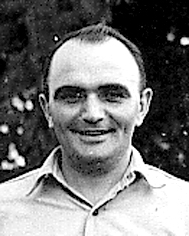
Fr James Stuart SSC
Pioneer to Refugees
Fr James Stuart was born in Derry in 1909. He was among the first group of Columban Fathers assigned to Burma in 1936.
In 1941, he was in a remote village in the north among the Kachins, when the Japanese attacked Pearl Harbour. In 1942 the Japanese army arrived in Burma to dislodge the British, the colonial rulers. Stuart would play an extraordinary role in events ready to unfold.
With the arrival of the Japanese, local people fled into the hills and even drove their pigs into the jungle to save them. Many Europeans, including school-children, became refugees.
Stuart housed the needy until he could arrange for their safe escape to India. The locals gave him rice and other necessities, and said he could have any pigs he could capture.
A Japanese captain arrived, planning to arrest him. Stuart said he was Irish. “Where’s Irish?” he was asked. Stuart drew a map showing Ireland in mid-Atlantic, not anywhere near the US or England. The Japanese officers were in admiration of this man who stood his ground, his incredible fearlessness, and provided him with food and medicine. They even posted a guard at the mission gates. Stuart then asked for a shotgun to shoot pigs. An officer lent him his own pistol.
On one occasion Stuart led a group of 241 refugees – mostly women, children and old men – on a 21-day trek through unfamiliar forests and swamps, braving incessant rain, with starvation, and the Japanese army, never far away.
On another occasion, together with Fr Denis McAlindon, he recruited porters and elephants to escort refugees to a landing strip from where they could be flown to India.
On his return from trips to India he was constantly in fear of arrest because of his work protecting refugees. After the war he was decorated with the Order of the British Empire.
When the American Army arrived in north Burma, Stuart was already a legend and almost every soldier knew his name.
On Stuart’s trips to India an American commander saw a man who could help in their campaign to wrest control from the Japanese. Stuart cut a dashing figure, suntanned, in paratrooper-boots, and a cowboy hat.
Stuart was ideal for their purpose: he spoke the Kachin language and knew the chiefs; having lived in the country since 1936 he knew Burma, he had met the Japanese, he was idealized by the local people.
The American Command asked him to become a contact person between the US Army and Kachin warriors. Stuart accepted, hoping that once the Japanese left he could get back to pastoral work, even farther to the north than the British had permitted.
In his new role with the US military he was constantly on the move. His most documented achievement was the rescue of dozens of downed American airmen, whom he led to safety with the help of local guides familiar with uncharted and difficult terrain. He was awarded the Medal of Freedom by the US government.
James Stuart died in his hometown at the age of 46, weakened by the legacies of pneumonia, malaria and typhoid, and worn out by jungle life in the hills of north Burma.
His beloved Burma still needs another James Stuart: statistics show the number of refugees from Burma in 2015 was 451,000; in 2016, this number increased to 490,300.
